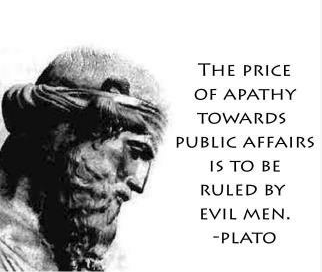List of expository and investigative news sources – plus tips for finding truths and protecting them
The origin story of Pres. Obama’s Fired Up, Ready to Go chant – animated
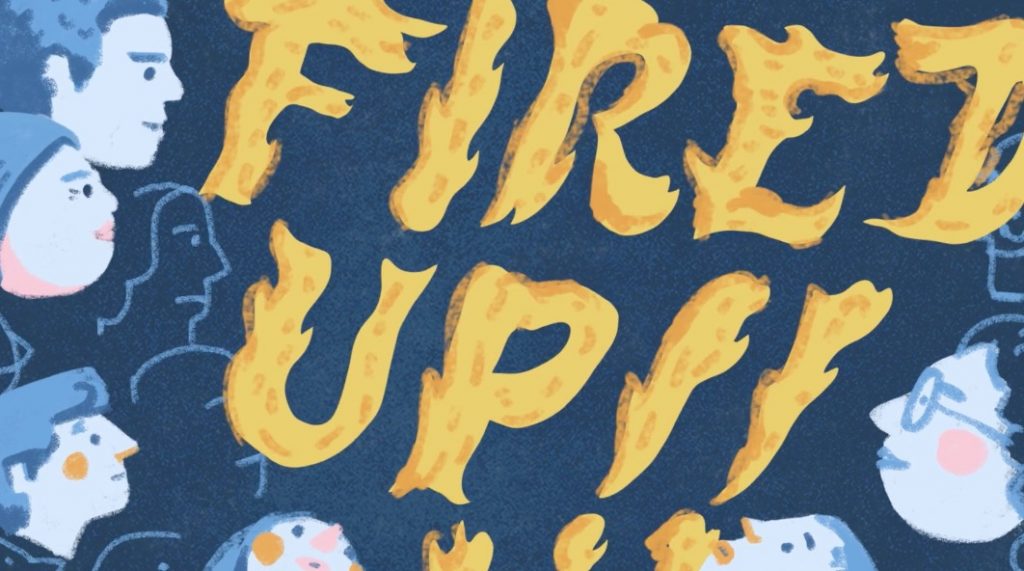
The origin story of Pres. Obama’s Fired Up, Ready to Go chant. A very inspiring story that contains a colorful private detective heroine.
So, please. Tell me again how your vote doesn’t matter.
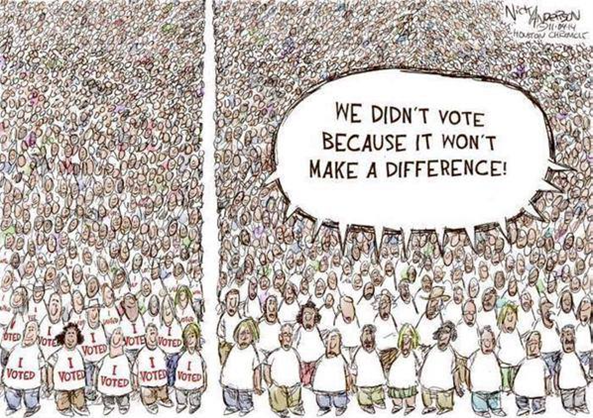
To all of you young people all riled up because #orangeman became president:
Better vote next time around.
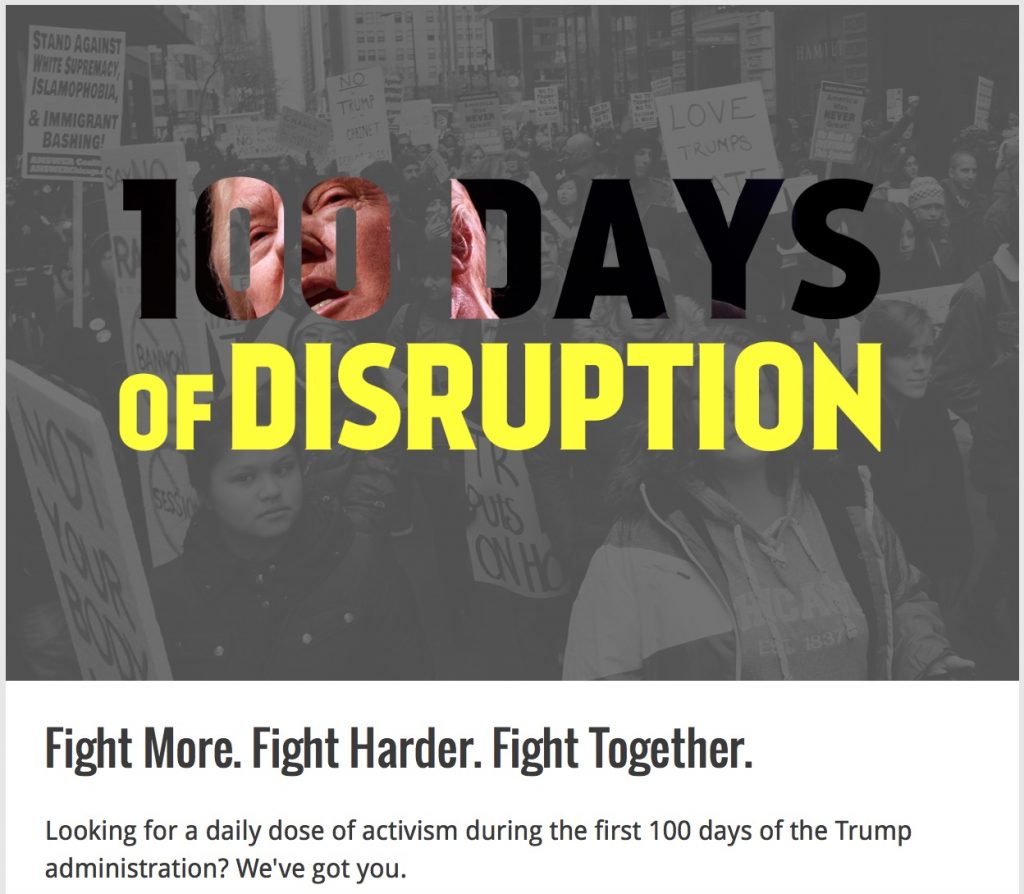
Meanwhile, join the FreePress 100 Days of Disruption and learn what protecting democracy means. Remember, democracy is not a spectator process. By definition, it can only be a participatory one.
Obama’s entire White House website, including data and Español/Spanish now live at the Obama Library site

All factual information from the Obama presidency is not lost! The President Obama White House website, including its Spanish language pages and its data catalog all remain publicly accessible at the ObamaWhiteHouse.gov website. Even the Obama White House social media feeds have been archived there.
Creation of this resource is another huge reason to thank President Obama: as of 23 January 2017, the incoming administration has already removed both climate change data and all Spanish language information. Pres. Obama’s team tells why he created the archive and what you’ll find there:
In January 2017, the White House website was archived as a way to preserve the online presence of the administration of President Barack Obama. Additionally, the websites for Mrs. Obama’s Let’s Move! Initiative, the We The People Petitions, and the White House Data Catalog (open.whitehouse.gov) were also preserved. These websites are historical material, “frozen in time.” They are no longer updated and links to external websites and some internal pages will not work.
These archived websites are an excellent resource for photographs, speeches, press releases, digital data, and other public domain records of the Obama Presidency from 2009–2017.
The official files making up the websites are archived in NARA’s Electronic Records Archives (ERA), however the website interface and functionality is preserved for easy use by the public through this portal.
Trevor Noah talks about his book on growing up in apartheid South Africa and inviting Tomi Lahren to The Daily Show

Trevor Noah speaks on The Breakfast Club about his autobiographical book on growing up knowing his birth – as a biracial child – was a crime in apartheid South Africa … a place where his mother had to dress as his nanny in order to be able to walk down the street with him.
Noah shares his questions and opinions on Donald Trump and speaks about his decision to invite Tomi Lahren to be his guest on The Daily Show. One reason for doing it was to have the chance to be heard by her audience, who otherwise would never learn anything about him.
Noah is a confirmed supporter of women, and women’s rights. He took fans who spoke crudely about Tomi after her show appearance. Noah told them, you can’t do that: you can’t pretend to be a defender of people rights when you turn around and make misogynistic statements about a woman.
The Breakfast Club interview is almost 50 minutes long, but well worth a listen, or a watch.
Opposition to draconian policies & politics can succeed
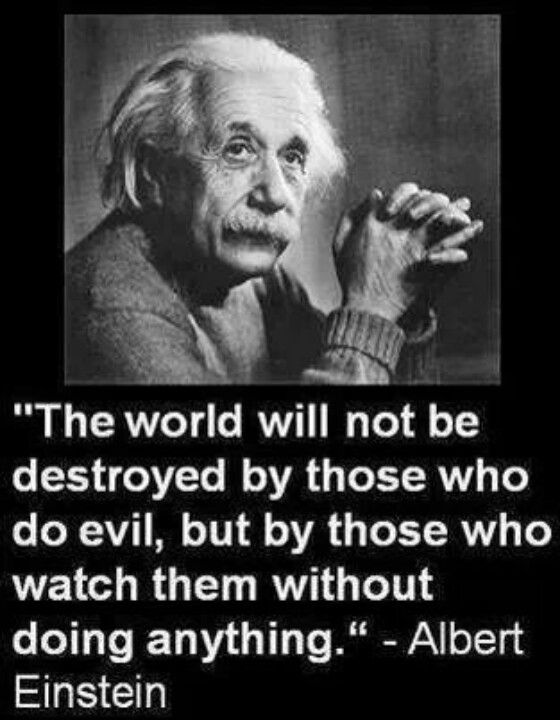
This heartening Op-Ed by Tina Rosenberg on the power of protests via the New York Times demonstrates that standing up against bad policies and politics can produce success … especially when the cause is just and the movement is organized.
And keep in mind … we must protect the open internet now more than ever before, so we can communicate freely. One of Trump’s first targets is dismantling the FCC, which has offered internet users a meaningful level of First Amendment and corporate abuse protections.
An excerpt:
Pull out the pillars. Gene Sharp, an American academic who is the guru of strategic nonviolence, argues that every leader, no matter his power, relies on obedience. Without the consent of the governed, power disappears. The goal of a civic movement should be to withdraw consent. Pull out the pillars, and the whole structure falls.
US depends on immigrants – pledge to join the boycott to protect their rights
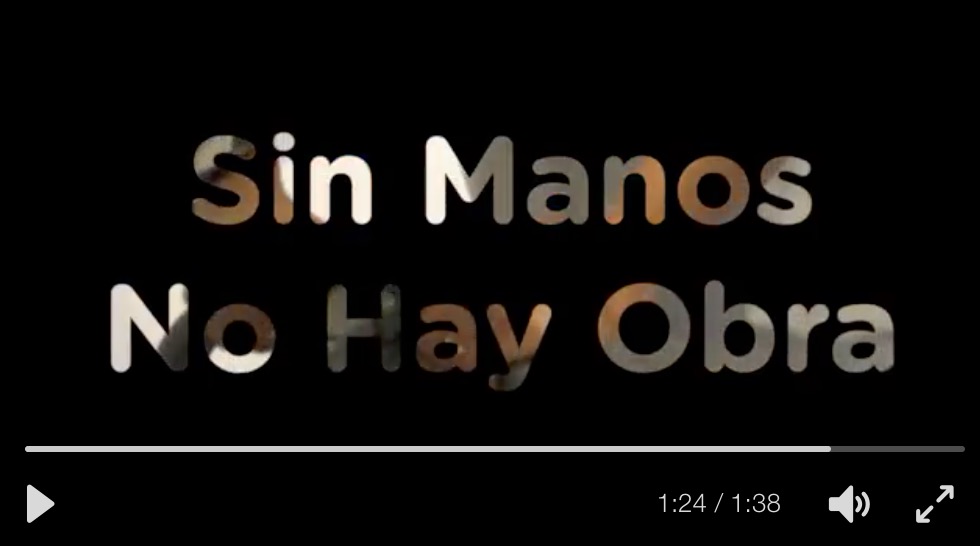
.@realDonaldTrump is https://t.co/gY10rg4e9x immigrants must boycott for dignity. Sign our pledge https://t.co/eKPXuaaqrU #migrantboycott pic.twitter.com/J8wMvORpbe
— Movimiento Cosecha (@CosechaMovement) November 9, 2016
Has Sweeney convinced NJ legislators to turn their backs on giving a living wage to NJ workers any time soon?
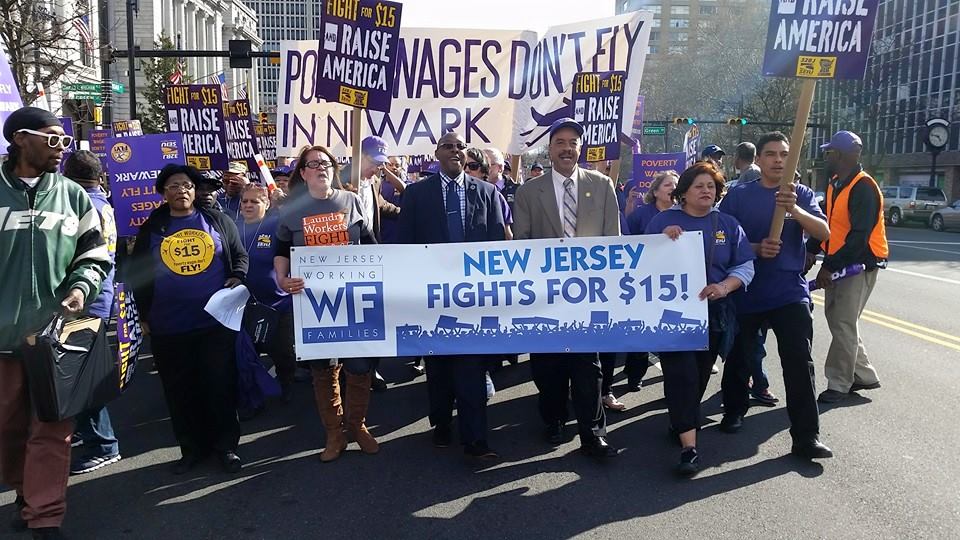
Why will New Jersey have a ballot referendum next year (aka constitutional amendment) that will allow state voters to decide whether to approve SCR1500 and increase the state’s minimum wage – but only by 62¢ in 2018 to $9 per hour and $1.00 a year after that to finally reach $15 an hour eight years from now, in 2024?
I got a slightly confusing reply from State Senator Bob Gordon to my email regarding this issue and have been checking into what his reply could mean. Here are the facts I’ve learned:
New Jersey Democrats were able to pass Bill A-15 on 23 June 2016 to raise the state’s minimum wage to $10.10 an hour in January 2017 and continue raising it in yearly $1.25 increments until it hit $15 an hour in 2021. But Christie vetoed that bill.
State legislators could then have put this same proposal on the ballot as a referendum, letting voters decide how quickly low wage workers could be lifted out of extreme poverty. They went the ballot referendum route, but opted for a much less robust hourly pay raise proposal: and that’s how SCR1500 came into being.
Perhaps the watered down bill is the brainchild of State Senate President Stephen Sweeney (D-Gloucester), whose (now derailed?) plans for a gubernatorial bid next year undoubtedly included courting the vote of the small business community. This community has essentially been convinced to vote against their own interests by Big Money supporters of low worker wages who have promoted a fear campaign to discourage their support for the $15/hour minimum wage.
Although small businesses are one group that stands to majorly benefit from the increased buying power that residents will be able to spend if they earn more, Big Money folk are making them believe that an alternate – and false – reality exists. That’s because the profits of Big Money-backed businesses like Walmart and the Fast Food industry will be seriously curtailed if they need to pay employees fair wages instead of setting them up to receive welfare and foodstamps to supplement starvation pay.
When worker wages are low enough to force families onto social welfare programs, taxpayers at all levels of the spectrum end up subsidizing workers’ food, shelter and medical care. Forbes reports on Walmart employees vast use of the welfare system and Bloomberg points out:
According to one study, American fast food workers receive more than $7 billion dollars in public assistance. As it turns out, McDonald’s has a “McResource” line that helps employees and their families enroll in various state and local assistance programs. It exploded into the public when a recording of the McResource line advocated that full-time employees sign up for food stamps and welfare.
Wal-Mart, the nation’s largest private sector employer, is also the biggest consumer of taxpayer supported aid. According to Florida Congressman Alan Grayson, in many states, Wal-Mart employees are the largest group of Medicaid recipients.
Larry Hamm & Danny Glover discuss how to carry Bernie Sanders’ progressive agenda forward
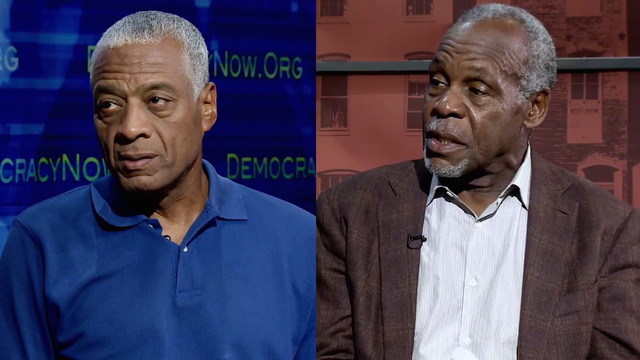
In a Democracy Now! interview, Larry Hamm and Danny Glover share their thoughts on how to carry forward the progress Bernie Sanders’ made during his presidential campaign toward swinging the Democratic Party back to a progressive political agenda (which it lost touch with some time ago).
And by the way, both gentleman plan to vote for Hillary Clinton in November.
LARRY HAMM: Yes. I’m going to follow the guidance of the standard-bearer Bernie Sanders, and I’m going to vote for Hillary Clinton. It’s a choice between neofascism, Donald Trump, and neoliberalism, Hillary Clinton. Donald Trump must be defeated, and not just defeated, he must be defeated decisively. There must be a repudiation of these ultra-right-wing and fascist tendencies that are supporting him and that are in his movement. The struggle against neoliberalism, which has been going on for the past 40 years, will continue after November the 8th.
And the Bernie Sanders movement is at a critical stage. Bernie Sanders did something that was tremendous in the political arena. He widened the space for progressive politics. But more than that, he proved that there is a critical mass of people in the United States that will support progressive, even radical, politics. And the challenge at this point is for all of those forces—because there’s one force. There’s the Bernie Sanders movement vis-à-vis the Democratic Party and the establishment and corporate leadership of that party, but within the Bernie Sanders movement itself, there are many tendencies. The question is: Are those tendencies going to be able to resolve their contradictions to the point—not eliminate them, but at least modify them to the point that they can hold together and keep this movement going? Or are they going to explode, explode and that movement go the way of the Rainbow Coalition movement, of which I was a part, after the Jesse Jackson campaign of 1988?
This is a very critical movement. The progressive genie—the genie of progressive politics is out of the bottle. There are powerful forces that want to put that back in. They want Bernie Sanders and his movement to go away. They want to return as business as usual. And our job is to make sure that that does not happen.
DANNY GLOVER: Yeah, I mean—
AMY GOODMAN: Danny Glover?
DANNY GLOVER: Larry said it perfectly, in the sense, what we do beyond the 9th of November is the most important thing that we’ll do in our lives right here. The work that we do, the way in which we nurture new leadership, the way in which we use progressive politics and get progressive leaders elected to local, regional government, national government, that those are the things that we’re going to do, in a sense.
But we have to really continue to understand the dialectics that we’re dealing with, and understanding that the dialectics are always changing in this situation. We’ve got to find a way. And as we bring this movement forward, it also uses its insight and imagination in the idea of transformation. Dr. King always talked about transformation and the need for not only us to transform the institution which govern us, the institution, but to transform ourselves. What does that transformation look like? What does it look like? What does it look like when we talk about environmental racism? What does it look about when you talk about the planet itself? What does it look like? What are all the things that we have to be talked about?
Uber won’t wait – rolls out driverless vehicles in Pittsburgh this month
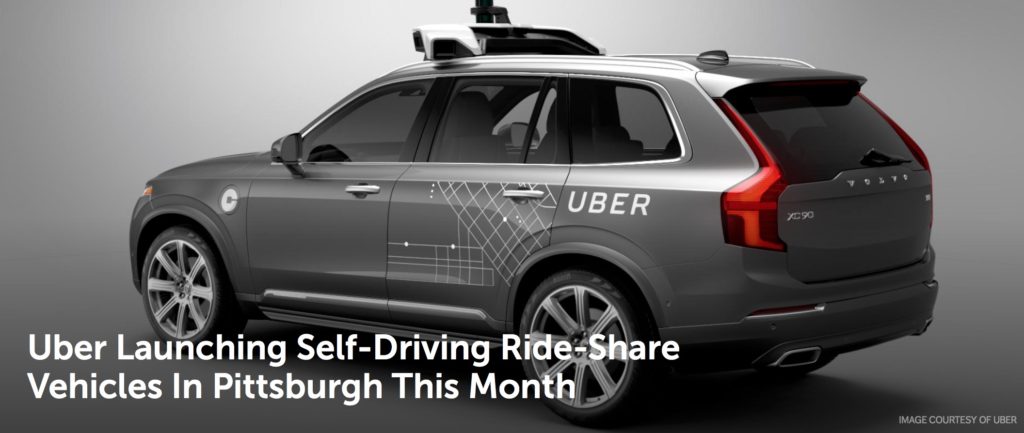
For whatever its reasons: to be seen as a innovation leader … due to bad press when a driver ran a little girl down and her family paid the funeral expenses because neither the driver nor Uber agreed to assume liability … Because the math shows that drivers make a lot less money than they thought they would after car expenses, wear and tear and time are calculated … or because Google and Tesla are hard on the heels of driverless technology revolution …
Whatever the reasons are, Uber is not waiting five years – or even one – to roll out driverless vehicles. Instead, the rollout launches this month in Pittsburgh, PA, with stand-by technicians at the wheels of cars and others taking notes but none} of them are supposed to interact with customers nor drive. Bloomberg provides details:
They’re trained engineers who sit with their hands on the wheel, prepared to take over if something unexpected happens. A copilot will assist from the passenger seat, taking notes, and everything is recorded by cameras inside and outside the vehicle. There’s also a tablet in the backseat telling passengers what’s going on, and urging them to pretend the other humans aren’t there.
“The goal is to wean us off of having drivers in the car, so we don’t want the public talking to our safety drivers,” Raffi Krikorian, the company’s engineering director, told Bloomberg.
Trips will be totally free at first, instead of $1.30 per mile, the local rate for Uber in Pittsburgh. Eventually, prices will fall so much that the cost of a driverless ride will be a lot cheaper than one in a private car, Kalanick says. As for why the company picked Pittsburgh — it’s where Uber has been working with robotics experts at Carnegie Mellon University.
Good reasons to release non-violent offenders after basic sentence fulfillment

This testimony was given by a member of the Integrated Justice Alliance (IJA) to the Senate Judiciary Committee on 14 July 2016.
Chairman and Members of the Senate Judiciary Committee,
Good afternoon. My name is Anna “Cuqui” Rivera and I am here today representing the Integrated Justice Alliance (IJA). Founded in 2008, a statewide network working toward a fair, effective criminal justice system: one that promotes public safety, the restoration of individuals and families, protects and safeguards the rights of individuals in custody, promotes transparency, ensures accountability and spends taxpayer dollars wisely.
I urge you to vote yes on Senate Bill 895 which would allow for the release of certain nonviolent offenders after they have completed their basic sentence, provided that they have not committed any serious disciplinary infractions while incarcerated and have complied with rehabilitation recommendations.
Incarcerating a low-risk individual after they have completed their basic sentence wastes taxpayer money and reduces their chance of successful reentry and reintegration into the community upon their release. The United States spent 67 billion dollars on incarceration in 2015, but not on education or prevention. The overuse of incarceration tears apart vulnerable families and communities.
While African Americans and Latinos make up less than 30 percent of the New Jersey population, they account for more than 80 percent of those who are incarcerated. And racial disparities in New Jersey prisons are the highest in the nation.
In addition to the huge financial cost of imprisonment, research shows that long prison sentences do not enhance public safety or promote rehabilitation. Instead, they simply prolong the separation of incarcerated people from their families and communities, further compounding the challenges they will face in their inevitable reintegration.
At the moment, many minor administrative delays mean that low level offenders often remain in prison long after they are eligible for parole at a very high tax payer price.
As a criminal justice reform advocate, I see members of my community going to prison in record numbers, only to return and find themselves hopelessly and repeatedly discriminated against in legitimate labor and housing markets. So many would benefit from shorter sentences followed by release to case management, community and counseling services; this would allow them to more easily reconnect with family and work towards becoming positive and productive members of society.
Ensuring the safety and well-being of our community is one of IJA’s highest priorities. Lengthy and unnecessary terms of incarceration cannot serve these objectives. We believe that morality, fair play, and common sense require us to pass the S-895 to ensure a less discriminatory and effective justice system.
Hundreds of Asian Americans create Google Doc letter in 1 day to tell their families about the relevance of #BlackLivesMatter
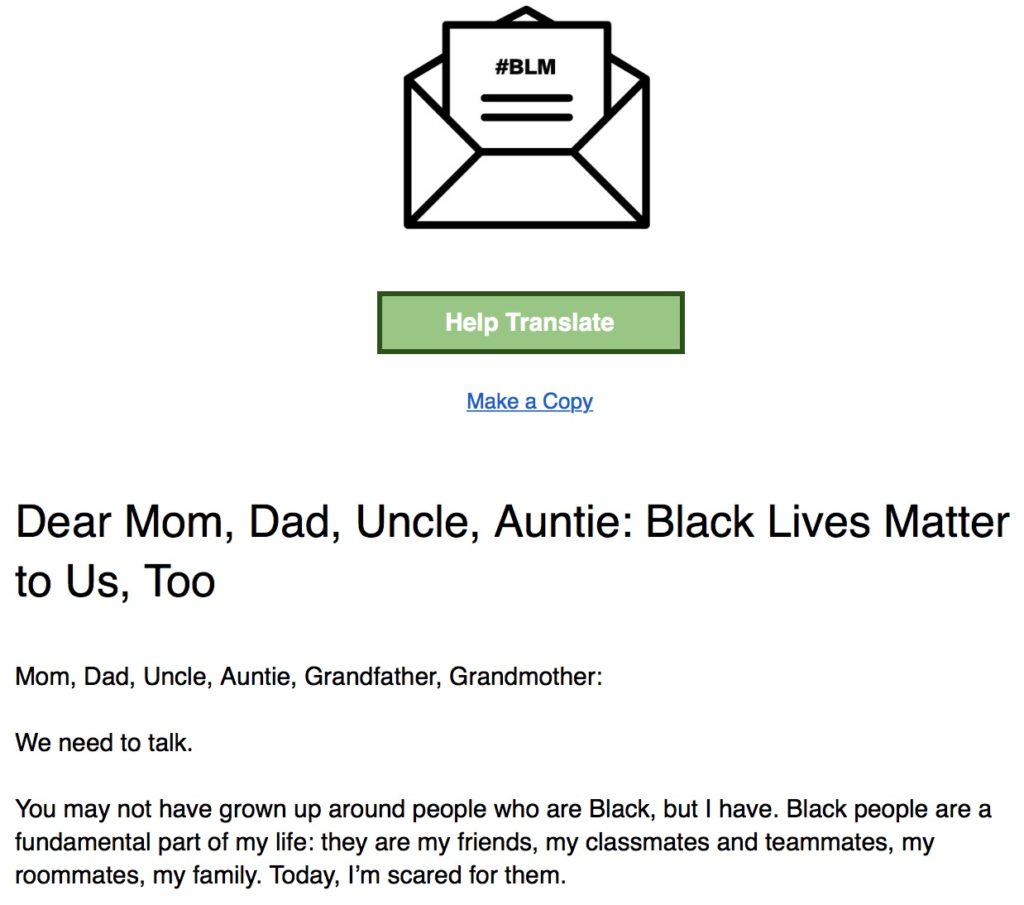
Brian Fung of the Washington Post reports on a completely new phenomenon that came to life this week when Christina Xu started a letter online to explain to Asian elders why the #BlackLivesMatter movement has relevance and importance for the Asian community, called for community input and acquired hundreds of collaborators in the space of just a few hours.
In fact, let’s draft letters in our native languages to our parents and our communities. Get it passed around WhatsApp, WeChat, LINE, etc.
— Christina Xu (@xuhulk) July 7, 2016
Using social media tools and the Google Docs platform, Americans with origins from many Asian countries worked together all of Thursday to write an open letter explaining this matter to their families and today, collaborators remained busy translating the letter into, “at least 11 Asian languages, from Japanese to Vietnamese.”
They call it, “An Open Letter To Our Parents About Black Lives,” by Letters for Black Lives. The reason they’re doing this is contained in the text of the letter itself:
“Black activists fought to open up immigration for Asians in the 1960s … Black people have been beaten, jailed, even killed fighting for many of the rights that Asian Americans enjoy today. We owe them so much in return.”
President, Press and Governor speak out: police brutality must be condemned and controlled

No man is an island entire of itself;
every man is a
piece of the continent,
a part of the main;
if a clod be washed
away by the sea, Europe is the less,
as well as if a promontory were,
as well as any manner of thy friends
or of thine own were;
any man’s death diminishes me,
because I am involved in mankind.
And therefore never send
to know for whom the bell tolls;
it tolls for thee.
– John Donne, Devotions upon Emergent Occasions Meditation XVII
This week saw the police murder father of five children Alton Sterling in Baton Rouge, Louisiana not long before school lunch supervisor and student mentor Philando Castile was murdered by a policeman near St. Paul, Minnesota.
New York Times writer Michael Eric Dyson offers a sizzling condemnation of white people for failing to hold brutal police accountable for killing people of color. Because ultimately, they don’t want to see that their greed for privilege has created and supports the social environment in which it is OK for this to happen. What a read:
You cannot know what terror we live in. You make us afraid to walk the streets, for at any moment, a blue-clad officer with a gun could swoop down on us to snatch our lives from us and say that it was because we were selling cigarettes, or compact discs, or breathing too much for your comfort, or speaking too abrasively for your taste. Or running, or standing still, or talking back, or being silent, or doing as you say, or not doing as you say fast enough…
You do not condemn these cops; to do so, you would have to condemn the culture that produced them — the same culture that produced you. Black people will continue to die at the hands of cops as long as we deny that whiteness can be more important in explaining those cops’ behavior than the dangerous circumstances they face.
Court ruling: New Jersey police must turn over dashcam video on request

The New Jersey Law Journal reports on dashcam ruling handed down 30 June 2016. It’s a win for justice and respectful police conduct:
New Jersey appeals court on June 30 ruled that police video recordings taken from dashboard cameras are documents that must be released under the state’s Open Public Records Act.
Hurrah! I’m happy with this news. NJLJ reports that court case was filed by “open-government activist John Paff.” Thanks for the great work, John.
The Wei endorses the Electronic Frontier Alliance Principles

The Wei endorses the Electronic Frontier Alliance Principles. The Electronic Frontier Alliance is a grassroots network of community and campus organizations across the United States working to educate our neighbors about the importance of digital rights. Participation is open to any group that endorses our simple principles.
Electronic Frontier Alliance Principles
As a member organization of the EFA, we believe that technology should support the intellectual freedom at the heart of a democratic society. In the digital age, that entails advancing:
Free Expression:
People should be able to speak their minds to whoever will listen.
Security:
Technology should be trustworthy and answer to its users.
Privacy:
Technology should allow private and anonymous speech, and allow users to set their own parameters about what to share with whom.
Creativity:
Technology should promote progress by allowing people to build on the ideas, creations, and inventions of others.
Access to Knowledge:
Curiosity should be rewarded, not stifled.
We uphold these principles by fighting for transparency and freedom in culture, code, and law.

